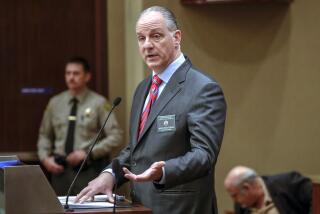L.A. County jail reforms sap deputy morale, union officials say
Reforms made to address excessive force in the Los Angeles County sheriff’s jails have caused deputy morale to hit an all-time low and allowed inmates to start running the jails, the president of the union for rank-and-file deputies said Friday.
Speaking before a county commission created to address jail abuse, union officials warned that new constraints on deputies for using force could have disastrous consequences.
“At some point in time, if the inmates feel empowered, they will riot. They will try to take it over,” said Floyd Hayhurst, president of the Assn. for Los Angeles Deputy Sheriffs. “You can feel it in the building when the morale is down. The inmates sense that too.”
Union officials pointed in particular to jailers being instructed to radio for supervisors if possible when they sense force might have to be used on an uncooperative or violent inmate. Hayhurst conceded that under ideal circumstances that might be a good idea, but in reality it backs things up in a fast-moving jail and robs deputies of the authority to resolve issues.
“Deputies should be allowed to at least try to handle the situation to conclusion,” Hayhurst said. “They feel that they have lost the authority to resolve issues that should be handled by a deputy sheriff.”
The Times reported last year that top sheriff’s officials reviewing old force incidents were raising alarms about deputies not calling in supervisors during altercations. Another internal audit found that deputies were crafting narratives “dramatized to justify” force.
In some cases, the jailers purposely delayed using weapons that could end fights, such as pepper spray and stun guns, “to dispense appropriate jailhouse ‘justice,’ ” the report said.
Jailer abuse and other misconduct are being investigated by the FBI. After the bureau’s probe was revealed and as allegations of problems in the jails mounted last year, the county Board of Supervisors created the commission to assess the problem and suggest reforms. Current and former sheriff’s officials have testified at the hearings that top managers allowed dishonesty and abuse to go unchecked.
Hayhurst, however, said the jails’ woes are being overblown.
“It’s being painted with a broad brush,” he said. “I’m not going to say there’s no bad deputies. That would be crazy to say. But I’d say the deputies as a whole are doing a fabulous job.”
The union said that inmates are aware of the situation and have taken advantage of it, often going around line-level deputies to make their complaints directly to supervisors. An internal union poll found that since Sheriff Lee Baca began instituting “town hall” meetings with inmates to hear their concerns, just over half of deputies have noticed more aggressive inmate behavior. More than 70% of deputies polled feel inmates’ respect for deputies has declined because they feel “empowered” as a result of those meetings.
Top sheriff’s officials, however, have said their reforms have worked, pointing to a significant drop in use-of-force incidents in recent months.
Baca’s spokesman, Steve Whitmore, said the jails’ inmates are under control.
“The downward trend of force in the jails indicates that our jails are probably the safest and most secure they’ve been, but his voice is very important for this commission to hear,” Whitmore said, referring to the union president.
The commission also heard on Friday from several custody experts from across the country who addressed how to best discipline dishonest deputies, eliminate a code of silence among jailers and formulate clear use-of-force policies.
The commission released a statement saying that when it requested records of all incidents of discipline for dishonesty, false statements and filing false reports over the span of five years, the sheriff’s department produced only two cases. One expert who testified called those numbers hard to believe even at a much smaller facility, let alone the nation’s largest jail system.
More to Read
Start your day right
Sign up for Essential California for news, features and recommendations from the L.A. Times and beyond in your inbox six days a week.
You may occasionally receive promotional content from the Los Angeles Times.







